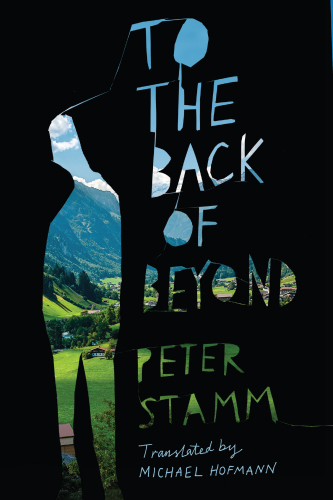
To the Back of Beyond
A Novel
- اطلاعات
- نقد و بررسی
- دیدگاه کاربران
نقد و بررسی

August 21, 2017
Stamm (Agnes) takes readers on a dazzling journey through Switzerland and matrimony. Thomas, following his return from a family vacation, suddenly decides to exit his garden, leaving behind his wife, Astrid, and their small children, Ella and Konrad. Thinking about how his marriage has stagnated and unable to arrive at a solution, Thomas wanders without aim, barely stopping to eat and sleep and using limited resources to survive. His roaming takes him to a brothel, through miles of woods and forest, and from village to village. Back home, Astrid is left to tell her children their father has vanished and to cover for Thomas, lying to his employer and those in the community about his whereabouts. She eventually reports Thomas’s disappearance to police despite fears of being ostracized by the community. On the suggestion from one of the officers, she uses online statements of Thomas’s bank transactions to track his movements near Lake Zurich. Stamm’s superb descriptions of alpine nature and internal human conflict (Thomas, wandering through the Alps, often reflects on his wife and family fondly but doesn’t want to return home) are aided by Hofmann’s excellent translation. Even when Thomas’s actions cause pain for those he has promised to love, his introspection makes his impulse to walk away from everything less condemnable. This is a moving work about freedom and wanting.

August 15, 2017
A man abandons his family for no discernible reason.In the latest from Swiss novelist Stamm (Agnes, 2016), Thomas and Astrid are relaxing outside their house shortly after returning from vacation. One of their two children cries out, and one of them must go see what's the matter. She goes and stays inside. Without premeditation, he waits and then starts walking. And keeps walking. With no chapter divisions, the narrative alternates between the two of them after he leaves, generally around four pages for each, describing what he does and how she feels. It is plain that both of them had been operating on autopilot, doing and saying the same things day after day for years on end. Maybe this was the problem. Maybe this is the human condition. In a rare moment of reflection, Thomas ponders the routine that had been his life, "the faith, the conviction that it was the right thing to do. He too had once formed part of this quiet consensus, he had functioned in the way that was expected of him, without it ever having been discussed." Now, on impulse, he has freed himself from that consensus in order to walk wherever for however long. Astrid also feels some freedom, along with various other emotions associated with stages of denial and acceptance. She doesn't quite feel that he is gone, because so much of her own routine remains unchanged. In fact, she felt like she "was making herself Thomas's accomplice...as though she was joined with him in some secret conspiracy." She covers for him with the kids and at his work, waiting for him to return, wondering if he will, wondering why he left. They had never argued. Maybe that was the problem. It would seem that there are only two ways that the novel can resolve itself, that either Thomas will return or he won't, but a Stamm parable is never so cut and dried. Toward the end, "the years had no particular chronology, the journeys no direction, the places stood in no discernible relation to one another."In this densely detailed, largely opaque book, the novelist leaves his readers as unmoored as his characters.
COPYRIGHT(2017) Kirkus Reviews, ALL RIGHTS RESERVED.

September 1, 2017
Thomashusband, father, accountant, handball team memberis not the sort to randomly disappear, but one night, as the family settles back into their routine following a vacation, he sets down his evening glass of wine unfinished and walks out the garden gate with only the clothes on his back. He treks his way out of town, cutting across Swiss cow pastures, scavenging food, and sleeping in the forest. Exposed to the elements as never before, Thomas revels in sensations and remembers the long-forgotten names of plants. Back at home, his wife, Astrid, does her best to keep up appearances, but she is gnawed by the need to understand what has happened. Questionable credit card charges at a brothel don't help. Stamm (Agnes, 2016) explores Thomas' and Astrid's wandering thoughts and disjunctive memories in powerfully plain prose and offers no easy explanations, leaving readers to either ache perpetually for answers, like Astrid, or accept their absence, like Thomas. Strong thematic and geographic echoes of an earlier notable Swiss writer, Robert Walser, suggest that homage is key to prize-winning Stamm's latest.(Reprinted with permission of Booklist, copyright 2017, American Library Association.)




دیدگاه کاربران